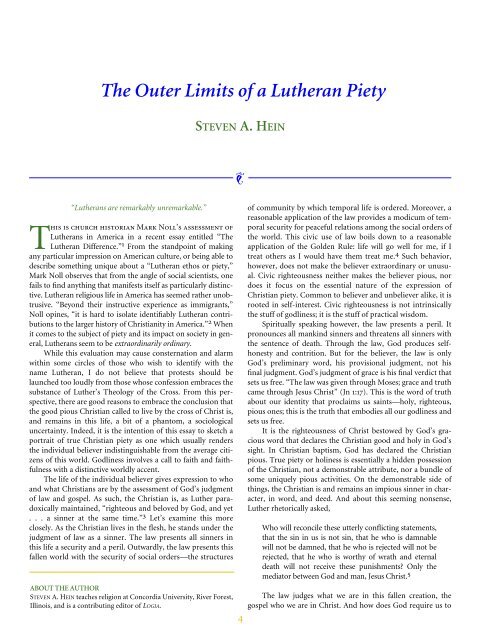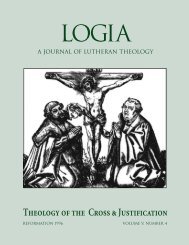The Outer Limits of a Lutheran PietySTEVEN A. HEIN“Lutherans are remarkably unremarkable.”THIS IS CHURCH HISTORIAN MARK NOLL’S ASSESSMENT OFLutherans in America in a recent essay entitled “TheLutheran Difference.” 1 From the standpoint of makingany particular impression on American culture, or being able todescribe something unique about a “Lutheran ethos or piety,”Mark Noll observes that from the angle of social scientists, onefails to find anything that manifests itself as particularly distinctive.Lutheran religious life in America has seemed rather unobtrusive.“Beyond their instructive experience as immigrants,”Noll opines, “it is hard to isolate identifiably Lutheran contributionsto the larger history of Christianity in America.” 2 Whenit comes to the subject of piety and its impact on society in general,Lutherans seem to be extraordinarily ordinary.While this evaluation may cause consternation and alarmwithin some circles of those who wish to identify with thename Lutheran, I do not believe that protests should belaunched too loudly from those whose confession embraces thesubstance of Luther’s Theology of the Cross. From this perspective,there are good reasons to embrace the conclusion thatthe good pious Christian called to live by the cross of Christ is,and remains in this life, a bit of a phantom, a sociologicaluncertainty. Indeed, it is the intention of this essay to sketch aportrait of true Christian piety as one which usually rendersthe individual believer indistinguishable from the average citizensof this world. Godliness involves a call to faith and faithfulnesswith a distinctive worldly accent.The life of the individual believer gives expression to whoand what Christians are by the assessment of God’s judgmentof law and gospel. As such, the Christian is, as Luther paradoxicallymaintained, “righteous and beloved by God, and yet. . . a sinner at the same time.” 3 Let’s examine this moreclosely. As the Christian lives in the flesh, he stands under thejudgment of law as a sinner. The law presents all sinners inthis life a security and a peril. Outwardly, the law presents thisfallen world with the security of social orders—the structuresABOUT THE AUTHORSTEVEN A. HEIN teaches religion at Concordia University, River Forest,Illinois, and is a contributing editor of LOGIA.4of community by which temporal life is ordered. Moreover, areasonable application of the law provides a modicum of temporalsecurity for peaceful relations among the social orders ofthe world. This civic use of law boils down to a reasonableapplication of the Golden Rule: life will go well for me, if Itreat others as I would have them treat me. 4 Such behavior,however, does not make the believer extraordinary or unusual.Civic righteousness neither makes the believer pious, nordoes it focus on the essential nature of the expression ofChristian piety. Common to believer and unbeliever alike, it isrooted in self-interest. Civic righteousness is not intrinsicallythe stuff of godliness; it is the stuff of practical wisdom.Spiritually speaking however, the law presents a peril. Itpronounces all mankind sinners and threatens all sinners withthe sentence of death. Through the law, God produces selfhonestyand contrition. But for the believer, the law is onlyGod’s preliminary word, his provisional judgment, not hisfinal judgment. God’s judgment of grace is his final verdict thatsets us free. “The law was given through Moses; grace and truthcame through Jesus Christ” (Jn 1:17). This is the word of truthabout our identity that proclaims us saints—holy, righteous,pious ones; this is the truth that embodies all our godliness andsets us free.It is the righteousness of Christ bestowed by God’s graciousword that declares the Christian good and holy in God’ssight. In Christian baptism, God has declared the Christianpious. True piety or holiness is essentially a hidden possessionof the Christian, not a demonstrable attribute, nor a bundle ofsome uniquely pious activities. On the demonstrable side ofthings, the Christian is and remains an impious sinner in character,in word, and deed. And about this seeming nonsense,Luther rhetorically asked,Who will reconcile these utterly conflicting statements,that the sin in us is not sin, that he who is damnablewill not be damned, that he who is rejected will not berejected, that he who is worthy of wrath and eternaldeath will not receive these punishments? Only themediator between God and man, Jesus Christ. 5The law judges what we are in this fallen creation, thegospel who we are in Christ. And how does God require us to
THE OUTER LIMITS OF A LUTHERAN PIETY 5swallow such “nonsense” and be obedient to it? Through faith!For this reason, the essential expression of the Christian’s pietyis subjective in character; it is faith in the heart, and hence it ishidden. The expression of true piety and godliness in the Theologyof the Cross is the obedience of faith and the expression offaithfulness. The outer limits of Christian piety, what the Christianis and what the Christian does, are tied to the call of God.This call causes the individual Christian to live a “provisional”life in this old fallen creation that can, indeed, merit the estimationof being “extraordinarily ordinary.” To appreciate this, andsurvey briefly the alternatives to this stance, we must explorethe concept of Christian vocation. In the history of theology,the concept of true Christian piety and godliness has been tiedto an understanding of God’s call to faith and faithfulness.CHRISTIAN PIETY WITHIN THE VOCATIO OF GODLuther often used a special term to designate the Christianlife of faithfulness, “vocation.” The word vocation comes fromthe Latin term, vocatio. A vocatio is a call or calling to a givenway of life. It grants an individual a particular standing andposition in relation to others within a community. Moreover,it defines how one meaningfully participates in and contributesto the life of the community. In other words, our vocation tellsus who we are within life’s social structures and what kind ofduties we have for the welfare of the community; it demandsthat we live lives of faith and faithfulness. We must trust ourvocation to live securely as members of society, and our faith isexpressed, in part, by faithfully being about the tasks that comewith our particular station.Christian life is lived as a calling, a vocation that flowsfrom God’s call and love for us in Christ. Through the gospel,he has called us to be sons and daughters in his family. This callis first and foremost a summons to a life of faith, a call to trustin God and who and what we are by his grace: forgiven andadopted children of his love. Christians have received theirvocational call from God in baptism. Baptism bestows on eachof us God’s gracious claim to be his child. His call brings fulland secure membership in his kingdom. The task that God hasgiven to us is to act out our faith in his calling. This is themeans of expressing our faithfulness to him and his family.True piety expresses or acts out our trust in who we are byGod’s call. Vocatio forms pietas. Major questions about Christianvocation must be addressed. How and where in the worldshould we live and serve our God as his children? What are ourtasks? What should be our relationship with the citizens andsocial structures of the world? What do our attachments andcommitments to our family, our work, and our civic involvementhave to do with living out the call of God? The churchthrough the ages has grappled with these questions and providedquite a spectrum of responses.St. Augustine, the great thinker of the ancient church, setforth his vision of God’s call in his monumental work, The Cityof God. Augustine conceived of the church as a pilgrim people,citizens of another age who are journeying through life in thisworld to their real home, “the City of God.” The call to faith isa call to faithful living as we travel on our way to the eternalkingdom that God will usher in at the close of the age. Augustinesaw citizenship as an exclusive status. Therefore sincebelievers are citizens of God’s eternal kingdom, they inhabitthe social structures of this world as foreigners, sojourners ontheir way to their real home. During the journey, God schoolsand outfits his people for the coming age. This was Augustine’svision of what Jesus meant in his call for his disciples to be inthe world, but not of the world. We live in the world, but asforeigners—citizens of the kingdom that is not identified withany temporal community. Our days on earth are focused onGod’s gracious power, transforming us in holiness, making usfit for life in the kingdom.This vision of Christian vocation created for Augustine akind of ambivalence toward the social communities of thisworld. Christians are to live peaceably within them, butbecause they are fallen and will pass away with the dawning ofthe kingdom, we must see the call of God and the higher tasksof faithfulness as transcending our involvement in them. Truegodliness involves for the faithful Christian a higher life whichwe pursue over and above the obligations and commitmentsthat arise from our sojourning in the world’s communities.The responsibilities of old world living are not of the same stuffas the works within a calling to divine citizenship. The Christianpilgrim may have to be involved with the former, but truepietas, true godliness flowing from faith, issues a higher orderof duties that flow from divine citizenship. For Augustine, oneis either a citizen of this world, or the City of God—but notboth. His portrait of the pious expressions of faith involved anextraordinary set of tasks, largely entailing self-discipline andspiritual devotion which stood over and beyond the everydayduties that spring from our sojourning in the social orders ofthis world. Here within the ordinary of life is the extraordinary,and this is the true stuff of Christian piety.. . . our vocation tells us who we arewithin life’s social structures.If this is really what true Christian piety is all about, whynot simply separate from the entanglements of this world andpursue godliness full time? In the second and third centuries,some radical Christian thinkers had just such a plan in mind.They placed an extreme emphasis on the negative side of thecall of God to be “not of the world.” Influenced by Greek Stoicphilosophy, their conception of the call of Christ was a call tolive in seclusion, divorced from all human community. Guidedby this vision, they equated the call of God with a life of isolationand self-denial. Many believers went out into the desertand lived solitary lives in caves. For them, true Christian pietywas tied up with an ascetic life of self-denial. They maintaineda meager physical existence with just enough food and water tokeep themselves alive. They were “hermits for Christ” whodevoted themselves to reading the Scriptures, prayer and meditationwhile waiting for God to usher in the fullness of the
















